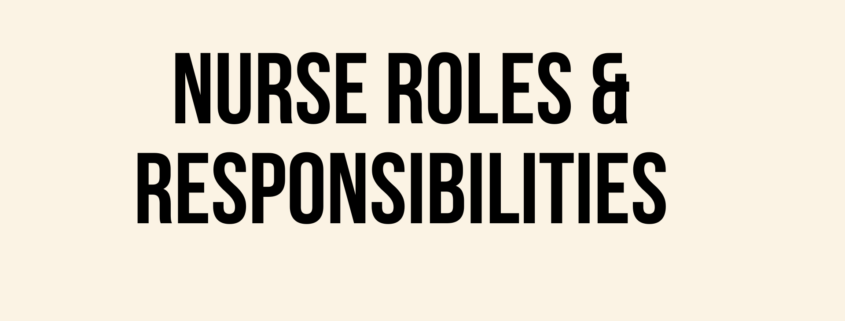Understanding the 7 Crucial Roles and Responsibilities of Nurses
Understanding the 7 Crucial Roles and Responsibilities of Nurses
Nursing is a noble and indispensable profession that plays a vital role in healthcare systems worldwide. Nurses are the backbone of the healthcare industry, providing compassionate and skilled care to individuals across all age groups and diverse healthcare settings. This blog post aims to shed light on the significant roles and responsibilities of nurses, highlighting their crucial contributions to patient care, promoting health and wellness, and enhancing the overall quality of healthcare delivery.

1. Roles and Responsibilities of Nurses as Patient Care Advocates
One of the fundamental roles and responsibilities of nurses is to act as advocates for their patients. They serve as the voice of patients, ensuring that their needs and preferences are communicated and respected. Nurses actively listen to patients and their families, understanding their concerns and preferences regarding their care. By acting as liaisons between patients, their families, and the healthcare team, nurses facilitate effective communication and coordination of care.
Patient care advocacy involves empowering patients with information about their condition, treatment options, and potential outcomes. Nurses educate patients about their rights and help them make informed decisions about their care. They ensure that patients’ cultural, religious, and personal beliefs are considered during the care planning process. By advocating for patient autonomy, nurses promote patient-centered care and foster a trusting relationship between the healthcare team and patients.
2. Roles and Responsibilities of Nurses as Direct Patient Care Providers
One of the primary roles and responsibilities of nurses is they are responsible for providing direct patient care. They are at the frontline, interacting with patients on a daily basis and addressing their healthcare needs. Nurses conduct comprehensive assessments to gather information about patients’ health conditions, medical history, and current symptoms. They use their expertise to identify potential health risks and formulate nursing diagnoses, which serve as the basis for individualized care plans.
Once the care plans are established, nurses implement them by administering medications, performing treatments, and monitoring patients’ progress. They play a crucial role in managing pain, providing wound care, and assisting with activities of daily living. Nurses are skilled in the use of medical equipment and technologies, ensuring safe and effective delivery of care.
Furthermore, roles and responsibilities of nurses include closely monitoring patients’ vital signs, observing for any changes in their condition, and promptly reporting abnormalities to the healthcare team. They collaborate with physicians and other healthcare professionals, providing them with essential information and contributing to the development of comprehensive treatment plans. Through their vigilant care and continuous monitoring, nurses help prevent complications, promote healing, and enhance patient comfort.
3. Roles and Responsibilities of Nurses as Educators and Health Promoters
Nurses play a vital role in educating patients, families, and communities about health promotion, disease prevention, and self-care management. They possess extensive knowledge about various health conditions, treatments, and preventive measures. Nurses provide essential information regarding healthy lifestyles, proper nutrition, exercise, and the importance of medication adherence.
By taking on roles and responsibilities of nurses in educating individuals about their conditions, nurses empower them to actively participate in their own care. They teach patients how to manage their symptoms, perform self-assessments, and recognize signs of deterioration. Nurses also provide guidance on medication administration, including dosage, timing, and potential side effects.
Additionally, nurses engage in health promotion activities within the community. They conduct health screenings, immunization drives, and public health campaigns to raise awareness about prevalent diseases and preventive measures. Nurses play a crucial role in promoting healthy practices, such as smoking cessation, weight management, and stress reduction. By emphasizing the importance of preventive care, nurses contribute to reducing the burden of disease and improving the overall well-being of individuals and communities.

4. Roles and Responsibilities of Nurses as Care Coordinators
Nurses serve as central coordinators in healthcare settings, working collaboratively with various healthcare professionals to ensure seamless care transitions. They are responsible for organizing and prioritizing patient care, managing appointments, and coordinating diagnostic tests and procedures. Nurses communicate with the interdisciplinary team, including physicians, therapists, social workers, and pharmacists, to ensure that the patient’s needs are met effectively.
Care coordination by nurses helps prevent fragmented care and enhances the continuity of care for patients. They ensure that patients receive appropriate referrals to specialists and that there is clear communication between different healthcare providers. Nurses also play a critical role in discharge planning, ensuring that patients are well-prepared for the transition from the hospital to home or other care settings. By coordinating care and facilitating effective communication, nurses contribute to improved patient outcomes and a smoother healthcare experience.
5. Roles and Responsibilities of Nurses as Emotional Support Providers
Nursing goes beyond physical care; nurses also provide emotional support to patients and their families. Illness and hospitalization can be emotionally challenging for patients, causing anxiety, fear, and stress. Nurses are trained to provide empathetic care and to create a therapeutic environment that promotes emotional well-being.
Nurses actively listen to patients’ concerns, validate their feelings, and provide emotional counseling when needed. They offer a comforting presence, lending a compassionate ear to patients who may be experiencing emotional distress. By acknowledging the emotional impact of illness and providing a supportive environment, nurses help alleviate anxiety and foster a sense of trust between patients and the healthcare team.
Nurses also extend emotional support to families, recognizing the stress they may experience while caring for their loved ones. They provide education, guidance, and resources to help families cope with the challenges they face during the healthcare journey. Nurses involve families in the care planning process, encouraging their participation and addressing any concerns they may have. By providing emotional support, nurses contribute to the holistic well-being of patients and their families.
6. Roles and Responsibilities of Nurses as Health Advocates and Promoters
Nurses are actively involved in health advocacy and promotion at both individual and community levels. They work towards improving the health of individuals and communities by addressing social determinants of health, advocating for health policies, and promoting healthy behaviors.
At the individual level, nurses assess patients’ health risks and provide guidance on preventive measures. They educate patients about the importance of regular health check-ups, screenings, and vaccinations. Nurses identify potential health hazards in patients’ environments and provide recommendations to mitigate risks. They also collaborate with patients to develop personalized health goals and action plans.
On a broader scale, nurses engage in community health initiatives. They participate in public health campaigns, conduct health fairs, and deliver educational programs on topics such as nutrition, hygiene, and safe sex practices. Nurses actively contribute to the development and implementation of public health policies, ensuring that the needs of individuals and communities are considered.
7. Roles and Responsibilities of Nurses as Researchers and Innovators
Nurses actively participate in research, evidence-based practice, and quality improvement projects. By conducting studies and implementing best practices as roles and responsibilities of nurses, they contribute to advancements in nursing care and patient outcomes. Nurses are involved in collecting data, analyzing trends, and identifying areas for improvement within healthcare settings.
Research conducted by nurses helps to identify evidence-based interventions that improve patient care and enhance healthcare delivery. They contribute to the development of protocols, guidelines, and standardized procedures that promote patient safety and quality of care. Nurses collaborate with interdisciplinary teams to develop innovative approaches and technologies that optimize the efficiency and effectiveness of healthcare.
Furthermore, nurses actively engage in continuous learning and professional development. They stay abreast of the latest research findings, attend conferences, and participate in workshops to enhance their knowledge and skills. By staying informed and embracing innovation, nurses ensure that their practice is evidence-based and aligned with the latest advancements in healthcare.
Conclusion
The roles and responsibilities of nurses extend far beyond what meets the eye. They are compassionate caregivers, educators, coordinators, advocates, and innovators. Nurses make a profound impact on the lives of individuals, families, and communities they serve. Their dedication, expertise, and tireless commitment to patient care are integral to achieving positive health outcomes and improving the overall quality of healthcare. Let us acknowledge and appreciate the invaluable contributions of nurses in our pursuit of a healthier and happier society.

Nursing Assignment Help
At Nursing Research Help, we understand the challenges that nursing students face in their academic journey. That’s why we are here to offer professional assignment help services specifically tailored to nursing students. Our team of experienced writers and subject matter experts in nursing will assist you in tackling your assignments with precision and excellence. Whether you need assistance with research papers, case studies, care plans, exam preparation or any other nursing-related assignments, our dedicated team is ready to provide you with high-quality, well-researched, and properly formatted papers that meet the highest academic standards.
With our reliable and confidential services, you can focus on your clinical rotations and practical experiences while leaving the academic workload to us. Don’t let the stress of assignments hinder your nursing education. Contact us today and experience the convenience and peace of mind that comes with our exceptional assignment help services for nursing students.












